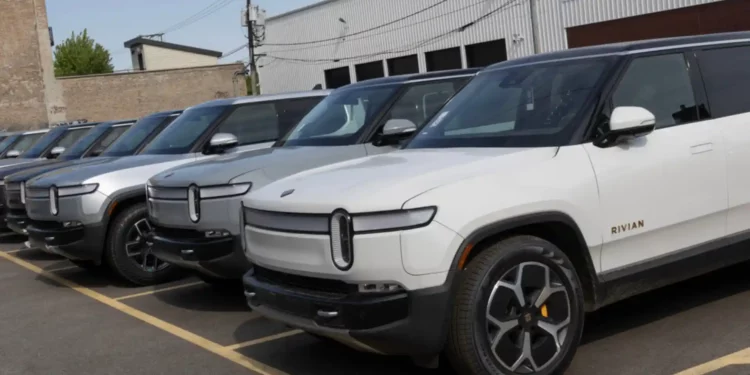The firms released a joint statement stating that VW and Rivian will “equally control and own” the new enterprise
Rivian Automotive Inc. is set to receive the necessary funding with its partnership with Volkswagen. The EV industry is generally facing a sluggish time and automakers of all sizes are planning to re-examine their approaches.
Many companies have expressed their intentions to form a joint venture with VW. They plan to form the partnership with an initial investment of $1 billion and possibly additional funding of up to $4 billion. In return, VW will receive a partner to create “next-generation” battery-powered vehicles and software, as well as access to the startup’s technology for use in its EVs.
After the statement Rivian published on Tuesday, the company shares have increased more than 50% in extended trading, regaining over half of the stock’s losses for the year.
The unexpected partnership gives the EV manufacturer a huge favour as it had difficulty increasing the output and delivery of its SUV and truck models. The American EV manufacturer halted its plans in March to construct a new manufacturing facility in Georgia to save money. The firm was also dealing with significant losses that totaled almost $39,000 for each car manufactured during the previous quarter.
The action is a result of larger auto sector layoffs brought on by an unexpected decline in demand for EVs. General Motors Co. recently stated that it will take “decades” for the EV industry to flourish, while Ford Motor Co. is reducing investment in electronic vehicles by $12 billion and delaying the opening of new facilities and models powered by batteries.
Consumers in general are largely unwilling to change to electronic vehicles and because of this, Rivian and other companies are struggling. Even Tesla Inc., the market leader, is seeing declining profit margins and underwhelming sales.
“It would be too expensive to go it alone, and investors are not as interested in EV companies as they were when Rivian first started,” clinical professor Erik Gordon of the University of Michigan’s Ross School of Business stated.
The firms released a joint statement stating that VW and Rivian will “equally control and own” the new enterprise.
Through an unsecured convertible note that will be exchanged into Rivian shares on or after December 1st, VW intends to acquire the initial $1 billion equity interest in Rivian. The largest shareholder in Rivian is Amazon.com Inc., with a 16% stake that was valued at around $2 billion as of Tuesday’s close.
Subsequently, the agreement mandates that VW spend an extra $2 billion in Rivian shares in two equal installments in 2025 and 2026. Additionally, the German manufacturer plans to contribute $2 billion to the joint venture through a loan that will be accessible in 2026 and a payment upon the business’s founding.
The EV manufacturer finds the agreement’s structure to be advantageous. Even if investors might give up some control to VW, if Rivian shares rise above their current price, there would be less equity dilution to bear and VW would ultimately hold a lower stake in the business after acquiring shares.
Rivian CEO RJ Scaringe said during a conference call following the announcement that the company will be able to move forward with its plans to build the new facility in Georgia with VW‘s support. By the terms of the contract, Rivian must still contribute $5 billion to the Georgia project by the end of the decade.
Analyst Garrett Nelson of CFRA Research says the announcement is a “vote of confidence in Rivian,” but it “does little” to solve the company’s cash deficit and operational issues. In November 2021, at the height of excitement around the imminent introduction of electric automobiles, Rivian went public, garnering interest as a potential formidable challenger to Tesla.
For a brief period, Rivian’s market value outdid that of Ford and GM due to an early surge in share prices. However, since then, a lot of EV firms have failed as mainstream consumers have shifted away from expensive versions. VW, the sizable German carmaker, will now have access to Rivian’s EV architecture and software after years of battling to produce plug-in vehicles as successful and efficient as Tesla’s.
Rivian has already attempted to partner with well-known automakers. In November 2021, it abandoned its plans to collaborate on the development of electric vehicles (EVs) with Ford, an early investor. In December 2022, it also cancelled an agreement with Mercedes-Benz to manufacture electric vans.


















